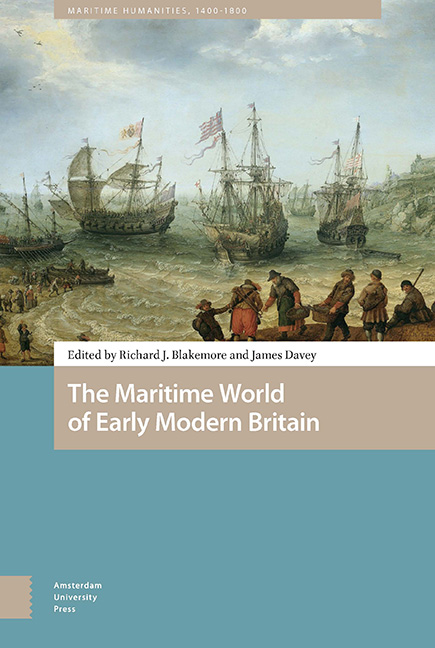Book contents
- Frontmatter
- Contents
- List of illustartions
- Acknowledgements
- Note on Conventions and Terminology
- Introduction
- 1 The Minion and Its Travels: Sailing to Guinea in the Sixteenth Century
- 2 Commanding the World Itself : Sir Walter Ralegh, La Popelinière, and the Huguenot Influence on Early English Sea Power
- 3 An Investigation of the Size and Geographical Distribution of the English, Welsh, and Channel Islands Merchant Fleet: A Case Study of 1571–72
- 4 An Evaluation of Scottish Trade with Iberia during the Anglo-Spanish War, 1585-1604
- 5 Performing ‘Water’ Ralegh : The Cultural Politics of Sea Captains in Late Elizabethan and Jacobean Drama
- 6 ‘Wicked Actions Merit Fearful Judgments’ : Capital Trials aboard the Early East India Company Voyages
- 7 A water bawdy house’: Women and the Navy in the British Civil Wars
- 8 ‘Thy sceptre to a trident change / And straight , unruly seas thou canst command’: Contemporary Representations of King Charles I and the Ship Money Fleets within the Cultural Imagination of Caroline England
- 9 ‘Proud Symbols of the Prospering Rural Seamen’ : Scottish Church Ship Models and the Shipmaster’s Societies of North East Scotland in the Late 17th Century
- 10 Systematizing the Sea : Knowledge, Power and Maritime Sovereignty in Late Seventeenth-Century Science
- Select Bibliography
- About the Contributors
- Index
2 - Commanding the World Itself : Sir Walter Ralegh, La Popelinière, and the Huguenot Influence on Early English Sea Power
Published online by Cambridge University Press: 21 November 2020
- Frontmatter
- Contents
- List of illustartions
- Acknowledgements
- Note on Conventions and Terminology
- Introduction
- 1 The Minion and Its Travels: Sailing to Guinea in the Sixteenth Century
- 2 Commanding the World Itself : Sir Walter Ralegh, La Popelinière, and the Huguenot Influence on Early English Sea Power
- 3 An Investigation of the Size and Geographical Distribution of the English, Welsh, and Channel Islands Merchant Fleet: A Case Study of 1571–72
- 4 An Evaluation of Scottish Trade with Iberia during the Anglo-Spanish War, 1585-1604
- 5 Performing ‘Water’ Ralegh : The Cultural Politics of Sea Captains in Late Elizabethan and Jacobean Drama
- 6 ‘Wicked Actions Merit Fearful Judgments’ : Capital Trials aboard the Early East India Company Voyages
- 7 A water bawdy house’: Women and the Navy in the British Civil Wars
- 8 ‘Thy sceptre to a trident change / And straight , unruly seas thou canst command’: Contemporary Representations of King Charles I and the Ship Money Fleets within the Cultural Imagination of Caroline England
- 9 ‘Proud Symbols of the Prospering Rural Seamen’ : Scottish Church Ship Models and the Shipmaster’s Societies of North East Scotland in the Late 17th Century
- 10 Systematizing the Sea : Knowledge, Power and Maritime Sovereignty in Late Seventeenth-Century Science
- Select Bibliography
- About the Contributors
- Index
Summary
Whosoever commands the sea, commands the trade; whosoever commands the trade of the world, commands the riches of the world, and consequently the world itself.
‒ Sir Walter RaleghTo historians of naval power, these words stand out for their insight and almost prophetic wisdom. Indeed, the Tudor and early Stuart navies are often assessed on the extent to which such words were heeded and the foundations were laid for Britain's later global pre-eminence supported by the three pillars of sea power, commerce, and empire. Yet it is difficult to escape the fact that, relative to its imperial rivals and in contrast to the volume and sophistication of much writing at the time on naval and imperial themes, Tudor England itself achieved limited success in overseas expansion and trade. Two alternative approaches, therefore, seem to present themselves to historians. England's relative backwardness can be emphasised to put into sharper relief its future successes. Or, credit can be given for the necessary, if hesitant, first steps that were taken.
Either way, the contested memory of Walter Ralegh, which Claire Jowitt addresses in her chapter, figures prominently. He articulated the height of Elizabethan ambition and attempted, with mixed results, to give them teeth through his voyages, his efforts at colonisation, and his violent attacks against Spanish interests. Whether as an ambitious man-of-action or an illustration of the still unrealised potential of the nation, this violent, self-styled Renaissance man is usually considered within a long historical view of emerging imperial systems, state-sponsored naval power, and commercial enterprise. His vision, however, was not simply of an empire of overseas colonies and maritime trade of the sort that future generations would later imagine as Britain's birthright. He was equally concerned with Spanish power and with what he saw as waning Habsburg imperial stature within Europe, and he made a far more immediate, pragmatic appeal for England to take advantage and to pursue naval strength as part of the traditional, competitive pursuit of dynastic security and monarchical reputation through war.
- Type
- Chapter
- Information
- Maritime World of Early Modern Britain , pp. 67 - 80Publisher: Amsterdam University PressPrint publication year: 2020

